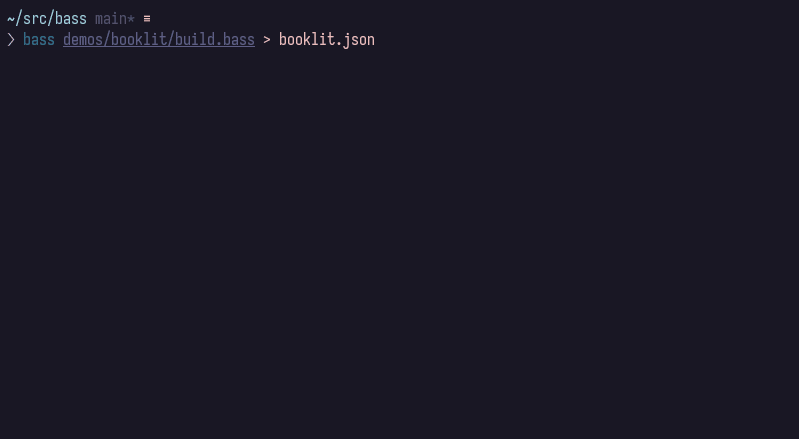Bass is a low-fidelity Lisp dialect for the glue code driving your project.
- you'd like to have a uniform stack between dev and CI
- you're sick of YAML and want to write code instead of config and templates
- you'd like be able to audit or rebuild published artifacts
- you're nostalgic about Lisp
Running a thunk:
(def thunk
(from (linux/ubuntu)
($ echo "Hello, world!")))
(run thunk)Passing thunk paths around:
; use git stdlib module
(use (.git (linux/alpine/git)))
; returns a thunk dir containing compiled binaries
(defn go-build [src pkg]
(subpath
(from (linux/golang)
(cd src
($ go build -o ./built/ $pkg)))
./built/))
(defn main []
(let [src git:github/vito/booklit/ref/master/
bins (go-build src "./cmd/...")]
; kick the tires
(run (from (linux/ubuntu)
($ bins/booklit --version)))
(emit bins *stdout*)))The (emit) call above writes the thunk path as a JSON tree structure to
stdout - effectively a recipe for building the path.
This JSON payload can be published (for provenance), archived (for auditing),
or fed to bass --export to build and extract it:
$ ./example > binaries.json
$ cat binaries.json | bass --export | tar -xf -For more demos, see demos ; bass.
Bass can be used as an alternative to writing one-off Dockerfiles for setting up CI dependencies. Bass scripts are isolated from the host machine, so they can be re-used easily between dev and CI environments, or they can be used to codify your entire toolchain in an open-source project.
In the end, the sole purpose of Bass is to run thunks. Thunks are encodable data structures for running containerized commands that produce files or return values. Files created by thunks can be easily passed to other thunks, forming one big super-thunk that recursively embeds all of its dependencies.
Bass is designed for hermetic builds and provides a foundation for doing so,
but it stops short of enforcing it. It trades purity for ergonomics, sticking
to familiar CLIs instead of abstract declarative configs. For reproducible
artifacts, your thunks must be hermetic. But if you simply
don't care yet, YOLO and apt-get all day and fix it up later.
For a quick run-through of these ideas, check out the Bass homepage.
To run a thunk, Bass's Buildkit runtime translates it to one big LLB definition and solves it through the client API. The runtime handles setting up mounts and converting thunk paths to string values passed to the underlying command. The runtime architecture is modular, but Buildkit is the only one so far.
- prerequisites:
git,go,upx
$ git clone https://github.com/vito/bass
$ cd bass
$ make -j installBass runs thunks with Buildkit, so you'll need
buildkitd running somewhere, somehow.
The included ./hack/buildkit/ scripts can be used if you don't have
buildkitd running already.
$ ./hack/buildkit/start # if needed
$ bass ./demos/go-build-git.bassmacOS support works by just running Buildkit in a Linux VM.
Use the included lima/bass.yaml template to manage the VM
with limactl.
$ brew install lima
$ limactl start ./lima/bass.yaml
$ bass ./demos/go-build-git.bassSame as Linux, using WSL2. Windows containers should work once Buildkit supports it.
- vim config: bass.vim
Plug 'vito/bass.vim'
lua <<EOF
require'bass_lsp'.setup()
EOFThe Buildkit runtime leaves snapshots around for caching thunks, so if you start to run low on disk space you can run the following to clear them:
$ bass --prune
Bass is named after the 🔊, not the 🐟. Please do not think of the 🐟 every time. It will eventually destroy me.
After 6 years working on Concourse I felt pretty unsatisfied and burnt out. I wanted to solve CI/CD "once and for all" but ended up being overwhelmed with complicated problems that distracted from the core goal: database migrations, NP hard visualizations, scalability, resiliency, etc. etc. etc.
When it came to adding core features, it felt like building a language confined to a declarative YAML schema and driven by a complex state machine. So I wanted to try just building a damn language instead, since that's what I had fun with back in the day (Atomy, Atomo, Hummus, Cletus, Pumice).
I think the pattern of YAML DSLs interpreted by DevOps services may be evidence of a gap in our toolchain that could be filled by something more expressive. I'm trying to discover a language that fills that gap while being small enough to coexist with all the other crap a DevOps engineer has to keep in their head.
After writing enterprise cloud software for so long, it feels good to return to
the loving embrace of (((one thousand parentheses))). For me, Lisp is the
most fun you can have with programming. Lisps are also known for doing a lot
with a little - which is exactly what I need for this project.
Bass is a descendant of the Kernel programming language. Kernel is
the tiniest Lisp dialect I know of - it has a primitive form beneath
lambda called $vau (op in Bass) which it leverages to replace the
macro system found in most other Lisp dialects.
Unfortunately this same mechanism makes Kernel difficult to optimize for production applications, but Bass targets a domain where its own performance won't be the bottleneck, so it seems like a good opportunity to share Kernel's ideas with the world.
Bass marries Kernel's semantics with Clojure's vocabulary and ergonomics, because you should never have to tell a coworker that the function to get the first element of a list is called 🚗. A practical Lisp should be accessible to engineers from any background.
It's getting there.
I'm using it for side-projects and enjoying it so far, but there's a lot of bootstrapping still to do. The workflow feels interesting; sort of like scripting as normal, but with a bunch of ephemeral machines instead of polluting your local machine.
One expectation to set: this project is built for fun and is developed in my free time. I'm just trying to build something that I would want to use. I don't plan to bear the burden of large enterprises using it.
Try it out! I'd love to hear experience reports especially if things don't go well. This project is still young, and it only gets better the more it gets used.
Pull requests are very welcome, but this is still a personal hobby so I will probably push back on contributions that substantially increase the maintenance burden or technical debt (...unless they're wicked cool).
For more guidance, see the contributing docs.
- John Shutt, creator of the Kernel programming language.
- Rich Hickey, creator of the Clojure programming language.
- The Buildkit project, which powers the default runtime.
- MacStadium, who have graciously donated hardware for testing macOS support.


